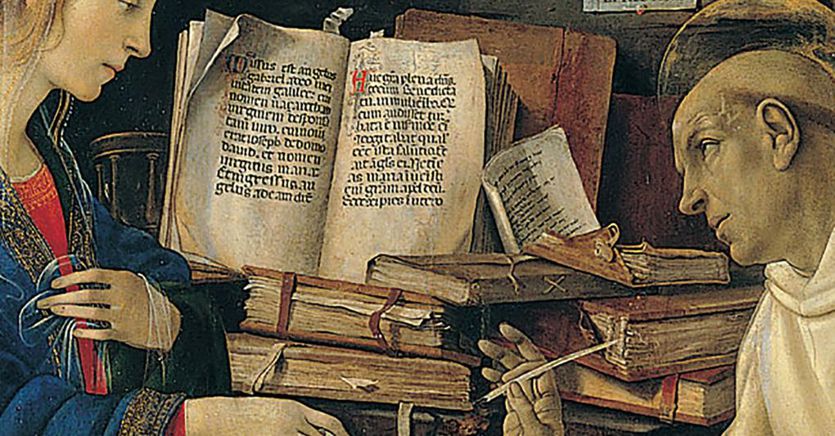Che what is the book for young Leonardo? To understand it, just look at the work he made at the age of twenty, the Annunciation . In the center, on a fantastic lectern between the Virgin and the angel, there is a book, sumptuous in matter and size. Her presence is certainly not new: in Western iconography the Virgin receives the announcement while she is intent on reading and meditating on a book. But here it is not a secondary detail: it is a living creature, liquid, with transparent sheets that float in the air, curl, come back. Maria’s fingers, rather than leaf through them, try to stop their movement and keep them open, and at the same time take care not to lose the strong physical bond that the eyes have already lost. It’s not a’ Annunciation . It is a dream interrupted by the external event that breaks the circle of suspension of space and time in which each of us enters when we read deeply.
Books that hold undecipherable secrets
The book is something magical, the repository of indecipherable secrets like the signs we see on the pages of the book of the Virgin. A strange relationship for someone who, the son of a notary and grandson of a merchant, was born in close contact with the world of written culture, an instrument of power and wealth; but he was also born to a woman who came from a world where writing was not even known, and it was she who gave him the fundamental teachings of life. Over time, Leonardo discovered that books were not magical objects but men like him, friends who could speak to him from a more or less distant past: the authors, or altori, as he called them. There is also something magical in this: the authors are dead, but they continue to talk, to say something. «Happy are those who will listen to the words of the dead», Leonardo writes in one of his “prophecies”. In the beginning, for him, it is the authors who tell the world, nature and man, even if in the different forms of myth, vision and encyclopedia: the Metamorphosis by Ovid, the Comedy of Dante, the Natural history by Pliny the Elder.
Loading…
Milano
Then Leonardo goes to Milan, and everything changes. Dream about becoming a altore. He frequents the shops of booksellers and stationers (“the last stationer in reverse the Corduso”), visits printers and paper mills, pursues friends and acquaintances to borrow books that he will never return. The way of reading and studying also changes. When he was a boy, he was more used to reading aloud, collective, participatory, which gives him the impression that textuality is a form of communication above all oral, inferior to painting because the ear is “less sense” than the eye “window of the soul”. Now, however, his is a reading entirely of the eye, silent, individual, at the desk and usually with the pen in hand, closely linked to the activity of writing on notebooks, and to the prodigious memory of his mental machine.
Intellectual study and artistic creation take place in this solitary workspace: not the admirable Wunderkammer of a sorcerer’s apprentice, but the humble room of a craftsman-reader. “And if you are alone, you will be all yours”, writes Leonardo, who however lives the unresolved dialectic of a perpetual oscillation between inside and outside, between the walls of his study and the conversation with men, in the street, in the shop , in the yard, in the court. Leonardo will never be a hermit, a genius separated from the world: his workshop will always remain an open field, free for the exchange and experimentation of ideas. Even if someone scolds him for still being a omo without letters, Leonardo begins to work as a humanist: he selects thousands of words from books that he has the sole purpose of ennobling language and style, transcribes texts, engages in continuous battles with altori to prove their mistakes based on the experience direct of things.
Voracious reader
Leonardo became a voracious, restless, irregular reader, just as his entire training was irregular and restless. Michel de Certeau wrote that the reader is a traveler, indeed, a poacher. Leonardo, who has no masters other than nature, has no qualms about plundering the lands of others, with the utmost freedom. It contaminates ideas and theories, ignoring the principle of authority. He devours and assimilates the ideas of others and makes them his own, reduces and shortens entire philosophical systems, even if then, when he meets an author like Justin who has shortened Livy’s immense Roman history, he condemns him as a cannibal. He disassembles and smashes his books, fortunately only metaphorically, triggering unprecedented interference. It uses a treatise on military art, the The military re by Roberto Valturio, not to make war but to plunder rare words and second-hand quotations from classical authors that he could never have read in the original language: Lucretius, Virgil, Plutarch. And no one before him, in the history of humanity, had thought of creating an anatomical atlas of the human body taking as a model the cartographic tables of a geography book, the Cosmography of Ptolemy.
